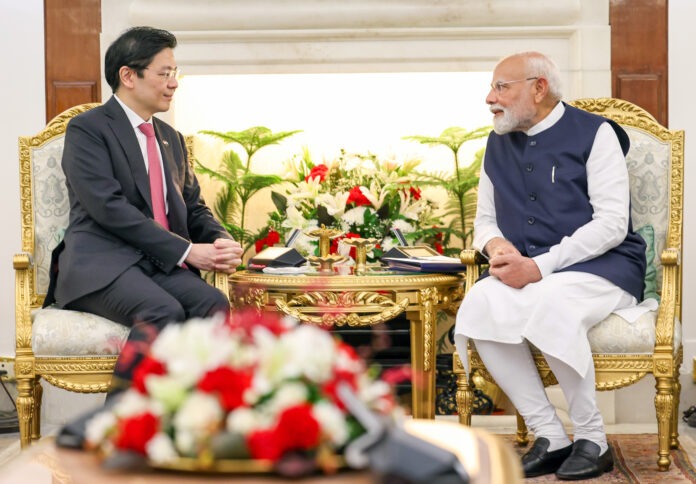
India and Singapore on Thursday reaffirmed their partnership by unveiling a wide-ranging roadmap to deepen cooperation in trade, defence, technology and people-to-people ties, as the two nations celebrated the 60th anniversary of diplomatic relations. Prime Minister Narendra Modi hosted Singaporean Prime Minister Lawrence Wong in New Delhi, marking Wong’s first official visit to India since assuming office.
At a joint press interaction, Modi described Singapore as “an important pillar” of India’s Act East policy and said the two countries were committed to advancing a joint vision for peace and stability in the Indo-Pacific region alongside ASEAN partners. He recalled his own visit to Singapore in 2024, when the two nations elevated ties to the level of a Comprehensive Strategic Partnership, and said the past year had seen cooperation gain speed and depth.
The Indian Prime Minister emphasised that relations between the two countries “go far beyond diplomacy.” He described the partnership as one rooted in shared values, guided by mutual interests and driven by a common vision for peace, progress and prosperity.
Modi said Singapore was now India’s largest trading partner in Southeast Asia, with large-scale investments flowing from the island nation. He added that defence ties were “continuously getting stronger” and highlighted the vibrancy of people-to-people relations.
Both leaders inaugurated Phase II of the JN Port – PSA Mumbai Terminal (BMCT), a project expected to boost trade capacity. They also announced that India and Singapore would review their Bilateral Comprehensive Economic Cooperation Agreement (CECA) and the Free Trade Agreement with ASEAN in a time-bound manner to accelerate trade and investment.
The talks placed strong emphasis on emerging sectors. Modi said cooperation would now extend beyond traditional areas to advanced manufacturing, green shipping, skilling, civil and nuclear energy, and urban water management. He announced that Singapore would help set up a National Centre of Excellence for Skilling in Chennai to prepare manpower for advanced manufacturing.
Technology and innovation emerged as key themes. Modi said both nations had agreed to enhance cooperation in artificial intelligence, quantum computing and digital technologies. He hailed UPI and Singapore’s PayNow as successful examples of cross-border digital connectivity and announced that 13 new Indian banks had now joined the platform. The two leaders also agreed to expand collaboration in the space sector and to host the next round of the India-Singapore Hackathon later this year.
The Semiconductor Ecosystem Partnership Agreement signed last year has already given a “new direction” to research and development, Modi said, noting the active participation of Singaporean companies in the Semicon India Conference. This, he added, showed how the partnership could directly benefit both innovation and industrial growth.
Modi also highlighted the role of states in strengthening ties. He recalled that during Singapore President Tharman Shanmugaratnam’s visit to India in January, he travelled to Odisha, while in the past year chief ministers of Odisha, Telangana, Assam and Andhra Pradesh had visited Singapore. Gujarat’s GIFT City has emerged as a bridge connecting the stock markets of the two nations, he said.
Defence and security formed another important pillar of discussion. Modi thanked Singapore for supporting India in the fight against terrorism and expressed gratitude for the condolences conveyed by Wong following the recent terrorist attack in Pahalgam. “We have common concerns about terrorism. We believe it is the duty of all humanitarian countries to fight terrorism in solidarity,” he said.
The new roadmap is also expected to benefit multiple sectors of the economy. By strengthening cooperation in trade, technology, manufacturing and green growth, officials say the agreement aims to make the partnership more comprehensive and future-oriented. For Singapore, the partnership provides an opportunity to expand its role in India’s economic growth story, while for India it means greater access to investment, technology and global markets.
Modi said the partnership had been elevated not only at the diplomatic level but also through industry and citizen engagement. From finance and manufacturing to research and education, Singapore’s role in India’s development has expanded steadily over the years, and the current initiatives signal an acceleration of that trend.
Observers note that the emphasis on digital connectivity and financial innovation fits with both countries’ focus on becoming hubs of digital finance and technology. The UPI-PayNow linkage is seen as a model for other cross-border payment systems, while cooperation in artificial intelligence and quantum technologies positions both nations at the forefront of emerging innovation.
The roadmap also reflects a strong regional dimension. By working with ASEAN to advance a shared vision for the Indo-Pacific, India and Singapore are signalling their intent to maintain stability and prosperity in a region marked by increasing competition.
The announcements also highlight the role of symbolic milestones. The 60th anniversary of diplomatic relations has provided an opportunity for both nations to reaffirm their partnership and to identify new areas of cooperation. Officials described the joint roadmap as a blueprint for taking the partnership to the next level, with practical initiatives in trade, technology, defence, skill development and people-to-people exchanges.
Singapore’s assistance in establishing the skilling centre in Chennai is expected to address India’s growing demand for trained manpower in advanced sectors, while collaboration in green shipping and urban water management aligns with sustainable development goals.
As the two Prime Ministers stood side by side in New Delhi, the message was one of continuity and renewal. For India and Singapore, the partnership has become a defining feature of regional cooperation, with the potential to expand further as global challenges reshape the economic and security landscape.
With strong trade links, growing defence cooperation, and deepening collaboration in technology and innovation, the India-Singapore relationship now appears poised to serve as a model of how shared values and mutual interests can drive a modern, comprehensive partnership.




